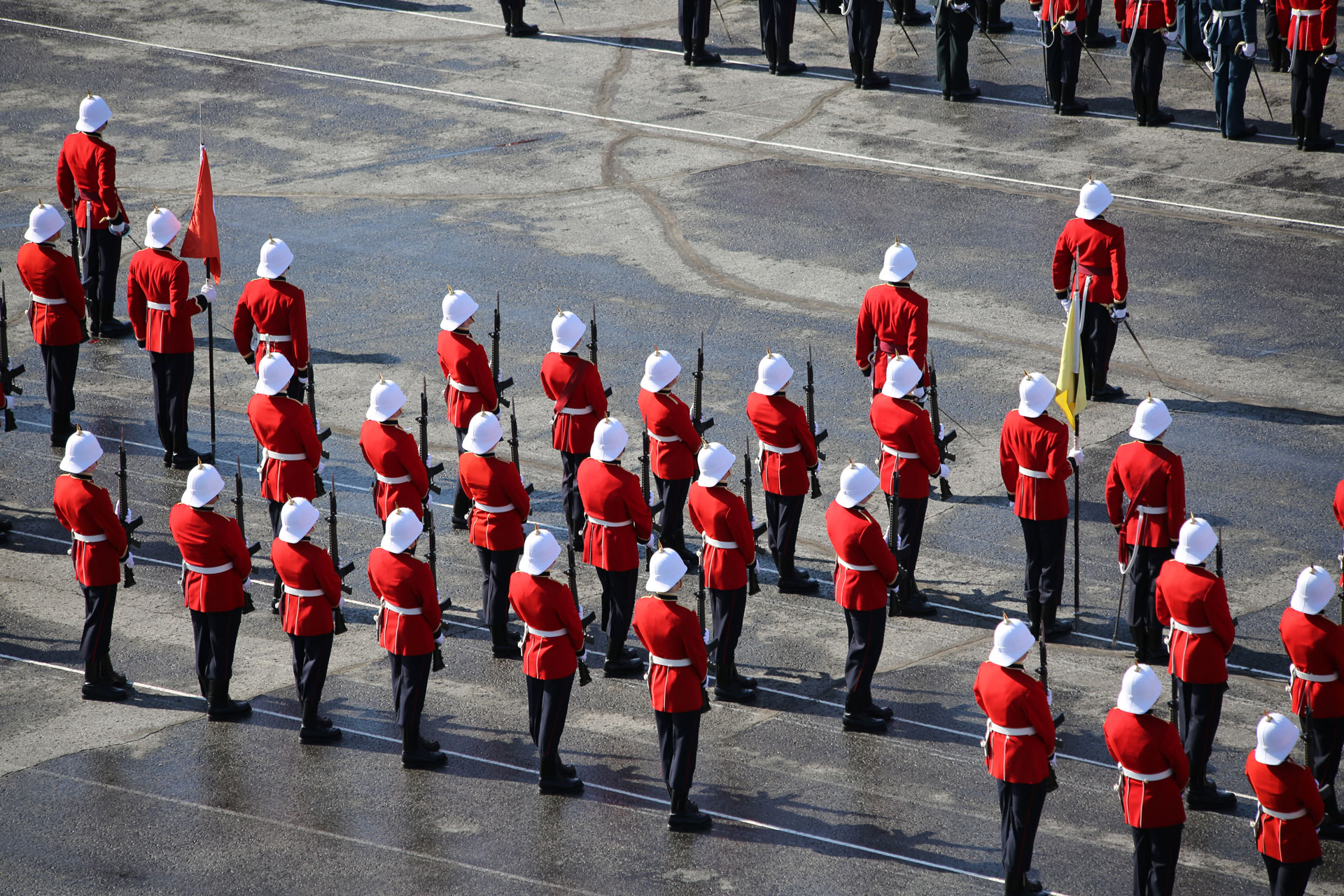
Reprinted from the Summer 2010 edition of Veritas magazine
H4860 Gen(Ret’d) John de Chastelain
REFLECTIONS AT A FUNERAL
 I spent part of the afternoon on Saturday of the Victoria Day weekend at the Beechwood National Military Cemetery in Ottawa attending the funeral of a Canadian soldier killed recently in Afghanistan. He was a young man on his first tour of duty in that country, much liked and respected by his fellow soldiers, and, I’m sure, much missed by them now. He was also from my regiment, which is one of the reasons I was there, but I’ve attended similar ceremonies for other soldiers at the cemetery in recent years.
I spent part of the afternoon on Saturday of the Victoria Day weekend at the Beechwood National Military Cemetery in Ottawa attending the funeral of a Canadian soldier killed recently in Afghanistan. He was a young man on his first tour of duty in that country, much liked and respected by his fellow soldiers, and, I’m sure, much missed by them now. He was also from my regiment, which is one of the reasons I was there, but I’ve attended similar ceremonies for other soldiers at the cemetery in recent years.
It was a beautiful and sunny afternoon and the event was conducted with the customary attention to military ceremonial and consideration for the members of his family. In the procession was one of his close friends, a soldier who’d accompanied his body back from Afghanistan and who appeared much moved by this final walk with his friend and comrade. He would return to Afghanistan after the ceremony was over.
This was an occasion filled with sadness for a young life lost, but also with a sense of pride that this soldier, like a number of others amongst whom he was being laid to rest, had died doing what he believed in, in a place far away, on a mission approved by his country and pursued by it over a period of years.
Watching the ceremony I was filled with a sense of disquiet. Not over the fact that a soldier had died and was being buried, although the sadness I felt at that circumstance and the sympathy I felt for his family in their grief was real. Soldiers know that their profession involves unlimited liability. What left me uneasy was the fact that Canada had signalled in September 2008 that its current mission in Afghanistan would end in 2011 and its combat troops would be withdrawn then. That time is fast approaching.
I understand the concern many Canadians feel over our continuing involvement in a war that has gone on much longer than either the Second World War or Korea, in both of which conflicts Canadians were so heavily engaged, and that the war in Afghanistan still shows no signs of imminent victory for the NATO coalition, while financial resources continue to be expended and lives lost. But it seems to me that signalling an end to our participation while the conflict continues gives heart to the enemy and provides them with an incentive to wait until impatience leads the coalition to give up and leave. I cannot recall another time when Canada has withdrawn from a war before it ended.
I have other concerns, most of which have already been well-documented by Canadians and by others who have visited Afghanistan, something I have not done. Principal among them is the possibility that our withdrawal may weaken the desire of other members of the NATO coalition to remain committed there. f that were to happen it could seriously undermine the war against the Taliban and betray the interests of those in Afghanistan who placed their faith and their future in the belief that the NATO-led International Security and Assistance Force (ISAF) would be there for however long was needed. They face a dismal future if ISAF does not succeed. I would also be concerned the failure of NATO in Afghanistan would lead to a serious undermining of confidence in the effectiveness of that organization, which many believe acts as a principal counter to world-wide military adventurism or terrorism.
Even though coalition lives continue to be lost and allegations of corruption and voting fraud may undermine the willingness of some to stay the course in Afghanistan, there are signs of success. General(Ret’d) Manson, writing in the Ottawa Hill News after returning from Afghanistan in October 2009, noted that a growing feeling of confidence has led citizens in local areas to show coalition soldiers where the Taliban has placed Improvised Explosive Devices aimed at them. And McLean’s magazine’s Paul Wells, commenting in the 26 April 2010 edition after his third visit to Afghanistan, notes: “I found more reason for optimism on this visit than on either of my other two visits.” He reports that with the recent American ‘surge’ and the hugely expanded ISAF presence in the Kandahar region, this summer could prove to be a turning point in the conflict. He concludes by saying that after we know the results of this summer’s campaign “it will be easier to decide, at last, whether there would be any point in staying further.”
And therein lay the basis of my uneasiness in the cemetery on Saturday. On the one hand I agree we should not remain in a conflict which we have concluded has no chance of success, expending ever more resources and the lives of our men and women. But I’m not sure Canada as a nation has reached that conclusion yet, and as long as we have not, I think we owe it to our NATO allies – and to the people of Afghanistan whom we have committed to help – to continue the fight. I also think we owe it to the young soldier I saw laid to rest, and to his comrades who died fighting for the same ideals.
REFLEXIONS AU COURS DE FUNÉRAILLES
Par: H4860 Gén (Ret) John de Chastelain
Traduit par A154 LCol P Labelle, R22eR
Samedi PM de la fin de semaine de la Fête des Patriotes, j’ai assisté, au Cimentière National Militaire de Beechwood à Ottawa, aux funérailles d’un soldat tué récemment en Afghanistan. C’était un jeune homme, à son premier tour dans ce pays, aimé et respecté de ses compagnons d’arme et qui déjà, j’en suis certain, leur manque. Il était aussi de mon Régiment, une raison parmi d’autres de ma présence, quoique j’aie participé à de telles cérémonies pour d’autres soldats ces dernières années.
C’était par un bel après midi ensoleillé; la cérémonie eut lieu avec toute l’attention coutumière que le protocole militaire exige par considération pour la famille. Dans le cortège, il y avait un ami proche, celui qui a accompagné d’Afghanistan le corps du défunt, très ému de marcher dans le dernier droit avec son compagnon et ami. Après la cérémonie, il a dû retourner en Afghanistan.
Ce fut une occasion remplie de tristesse suite à la perte d’une jeune vie mais il y avait aussi un sens de fierté à l’effet que ce soldat , à l’instar de beaucoup d’autres comme lui, soit mort en faisant ce en quoi il croyait, tout au loin, dans une mission à laquelle son pays souscrit depuis un certain nombre d’années déjà.
Tout en observant la cérémonie, je fus envahi d’un certain malaise. Rien à voir avec le fait qu’un soldat soit mort et qu’on l’enterrait, quoique je fusse quand même triste en la circonstance et que je compatissais avec la famille. Les soldats savent trop bien que la profession des armes exige un engagement total et sans limite. Mon malaise tient plutôt au fait que le Canada a signifié son intention en septembre 2008 de mettre fin à la présente mission en 2011 retirant ainsi ses troupes de combat. La date butoir est à nos portes.
Je comprends les préoccupations de nombreux Canadiens face à notre participation à une guerre qui dure depuis beaucoup plus longtemps que n’ont duré la Seconde Guerre Mondiale ou la guerre de Corée, deux conflits où les Canadiens ont été si fortement engagés et au fait que la guerre en Afghanistan ne montre encore aucun signe de victoire imminente par la coalition OTAN. A cela s’ajoute le fait que des ressources financières continuent d’être dépensées et que des vies humaines soient perdues. Mais il me semble qu’en signifiant la fin de notre participation, alors que le conflit perdure, cela donne des ailes à l’ennemi et l’incite à attendre que l’impatience nous gagne et mène la coalition à abandonner et à partir. A ma souvenance, jamais le Canada ne s’est retiré d’une participation à un conflit avant la fin du dit conflit.
J’ai d’autres préoccupations, dont la plupart a déjà été bien documentée par des Canadiens et d’autres qui ont visité l’Afghanistan, ce que je n’ai pas fait. Principalement, la possibilité que notre retrait puisse affaiblir la volonté des autres membres de la coalition de l’OTAN à demeurer engagés là-bas. Si cela devait s’avérer, cela pourrait sérieusement porter atteinte à la guerre contre les talibans et trahir les espoirs de ceux qui, en Afghanistan, ont placé leur confiance et leur avenir dans la conviction que la Force internationale d’assistance à la sécurité (FIAS), une coalition de l’OTAN, serait là tant et aussi longtemps que le besoin existe. Les Afghans font face à un avenir sombre si la FIAS ne réussit pas. Je crains également que l’échec de l’OTAN en Afghanistan n’entache sérieusement la confiance dans l’efficacité de cette organisation, dont d’aucuns estiment qu’elle agit comme un chien de garde contre l’aventurisme militaire mondial ou le terrorisme.
Même si la coalition continue de subir des pertes en vies humaines et malgré que des allégations avérées de corruption et de fraude électorale puissent miner la volonté de certains de garder le cap en Afghanistan, il y a des signes de succès. Le Général (ret) Manson a écrit dans les « Nouvelles de la Colline » à Ottawa après son retour d’Afghanistan en Octobre 2009. Il a noté qu’un sentiment croissant de confiance a conduit des citoyens à montrer aux soldats de la coalition les endroits où les talibans avaient placé des engins explosifs improvisés. Et Paul Wells du MacLean’s, commentant dans l’édition du 26 avril 2010, après sa troisième visite en Afghanistan, note: «J’ai trouvé plus de raisons d’être optimiste lors de cette dernière visite que lors de mes deux premières ». Il mentionne que l’expansion récente américaine et la présence considérablement accrue de la FIAS dans la région de Kandahar, cet été, pourrait s’avérer être un tournant dans le conflit. Il conclut en disant qu’une fois les résultats de la campagne d’été connus, il sera plus facile de décider, enfin, s’il y a lieu d’y demeurer encore.
C’était là mon malaise dans le cimetière en ce samedi. D’une part je suis d’accord qu’il ne faut pas continuer à nous battre dans un conflit où nous avons conclu en aucune chance de succès, y consacrant toujours plus de ressources et y subissant toujours plus la pertes de vie de nos hommes et femmes. Mais je ne suis pas certain que le Canada, en tant que nation, ne soit encore parvenu à cette conclusion ; et tant et aussi longtemps que nous n’en ne serons pas venus à cette conclusion, je pense que nous devons à nos alliés de l’OTAN et au peuple afghan auprès de qui nous nous sommes engagés à aider, de poursuivre la lutte. Je pense aussi que nous le devons à ce jeune soldat, que j’ai vu être conduit à son dernier repos ainsi qu’à ses camarades ayant subi le même sort.dans la poursuite de leurs idéaux.

